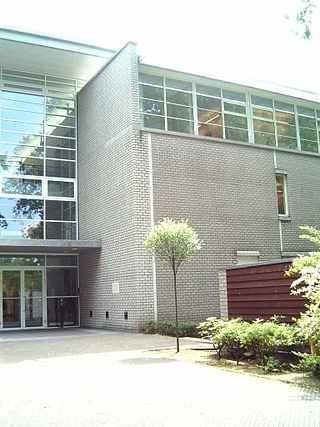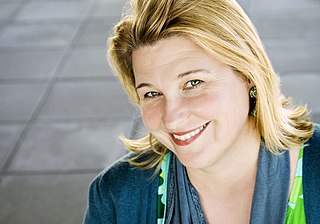
The University of Bonn, officially the Rhenish Friedrich Wilhelm University of Bonn, is a public research university located in Bonn, North Rhine-Westphalia, Germany. It was founded in its present form as the Rhein-Universität on 18 October 1818 by Frederick William III, as the linear successor of the Kurkölnische Akademie Bonn which was founded in 1777. The University of Bonn offers many undergraduate and graduate programs in a range of subjects and has 544 professors. The University of Bonn is a member of the German U15 association of major research-intensive universities in Germany and has the title of "University of Excellence" under the German Universities Excellence Initiative.

The Max Planck Society for the Advancement of Science is a formally independent non-governmental and non-profit association of German research institutes. Founded in 1911 as the Kaiser Wilhelm Society, it was renamed to the Max Planck Society in 1948 in honor of its former president, theoretical physicist Max Planck. The society is funded by the federal and state governments of Germany.

The Kaiser Wilhelm Society for the Advancement of Science was a German scientific institution established in the German Empire in 1911. Its functions were taken over by the Max Planck Society. The Kaiser Wilhelm Society was an umbrella organisation for many institutes, testing stations, and research units created under its authority.
The Max Planck Institute for Solid State Research was founded in 1969 and is one of the 82 Max Planck Institutes of the Max Planck Society. It is located on a campus in Stuttgart, together with the Max Planck Institute for Intelligent Systems.

The Max Planck Institute for Brain Research is located in Frankfurt, Germany. It was founded as Kaiser Wilhelm Institute for Brain Research in Berlin 1914, moved to Frankfurt-Niederrad in 1962 and more recently in a new building in Frankfurt-Riedberg. It is one of 83 institutes in the Max Planck Society.

The Max Planck Institute for Polymer Research is a scientific center in the field of polymer science located in Mainz, Germany. The institute was founded in 1983 by Erhard W. Fischer and Gerhard Wegner. Belonging to the Chemistry, Physics and Technology Section, it is one of over 80 institutes in the Max Planck Society (Max-Planck-Gesellschaft).
The Max Planck Institute of Neurobiology was a research institute of the Max Planck Society located in Martinsried, a suburb of Munich in Germany. It existed between 1984 and 2022 and merged with the Max Planck Institute for Ornithology to the new, joint Max Planck Institute for Biological Intelligence in 2023.

The Max Planck Institute for Psycholinguistics is a research institute situated on the campus of Radboud University Nijmegen located in Nijmegen, Gelderland, the Netherlands. The institute was founded in 1980 by Pim Levelt, and is unique for being entirely dedicated to psycholinguistics, and is also one of the few institutes of the Max Planck Society to be located outside Germany. The Nijmegen-based institute currently occupies 2nd position in the Ranking Web of World Research Centers among all Max Planck institutes. It currently employs about 235 people.
The Max Planck Institute of Psychiatry is a scientific institute based in the city of Munich in Germany specializing in psychiatry. Currently directed by Elisabeth Binder and Alon Chen, it is one of the 81 institutes in the Max Planck Society.

The Max Planck Institute (MPI) for Biology of Ageing, founded in 2008, is one of over 80 independent, non-profit-making institutes set up under the umbrella of the Max Planck Society. The overall research aim is to obtain fundamental insights into the aging process and thus to pave the way towards healthier aging in humans. An international research team drawn from almost 30 nations is working to uncover underlying molecular, physiological and evolutionary mechanisms.

The Hausdorff Center for Mathematics (HCM) is a research center in Bonn, formed by the four mathematical institutes of the Rheinische Friedrich-Wilhelms-Universität Bonn, the Max Planck Institute for Mathematics (MPIM), and the Institute for Social and Economic Sciences.

Bernhard Hassenstein was a German biologist and psychobiologist.

Armin Falk is a German economist. He has held a chair at the University of Bonn since 2003.

Angela Friederici is a director at the Max Planck Institute for Human Cognitive and Brain Sciences in Leipzig, Germany, and is an internationally recognized expert in neuropsychology and linguistics. She is the author of over 400 academic articles and book chapters, and has edited 15 books on linguistics, neuroscience, language and psychology.

Tania Singer is a German psychologist and social neuroscientist and the scientific director of the Max Planck Society's Social Neuroscience Lab in Berlin, Germany. Between 2007 and 2010, she became the inaugural chair of social neuroscience and neuroeconomics at the University of Zurich and was the co-director of the Laboratory for Social and Neural Systems Research in Zurich. Her research focuses on the developmental, neuronal, and hormonal mechanisms underlying human social behavior and social emotions such as compassion and empathy. She is founder and principal investigator of the ReSource project, one of the largest longitudinal studies on the effects of mental training on brain plasticity as well as mental and physical health, co-funded by the European Research Council. She also collaborates with the macro-economist Dennis Snower on research on caring economics. Singer's Caring Economics: Conversations on Altruism and Compassion, Between Scientists, Economists, and the Dalai Lama was published in 2015. She is the daughter of the neuroscientist Wolf Singer.
The Ernst Strüngmann Institute for Neuroscience in Cooperation with Max Planck Society (ESI) is an independent research institute financed by Andreas' and Thomas Strüngmann, German entrepreneurs, and named after their father Dr. Ernst Strüngmann. The ESI is under the scientific governance of the Max Planck Society. It is located in Frankfurt am Main in Hesse. ESI-directors are Scientific Members of the Max Planck Society. ESI’s mission is to perform excellent fundamental brain research. ESI research focuses on understanding how the many parts of the brain work together to bring about our behaviour.

Herwig Baier is a German neurobiologist with dual German and US-American citizenship. He is Director at the Max Planck Institute for Biological Intelligence and head of the department Genes – Circuits – Behavior. Herwig Baier's research aims to understand how animal brains convert sensory inputs into behavioral responses.
The Werner Reichardt Centre for Integrative Neuroscience (CIN) is the common platform for systems neuroscience at the University of Tübingen in Germany. It was installed as a cluster of excellence within the framework of the Excellence Initiative in 2007/2008. About 90 scientists with their research groups – 21 of which are currently supported with excellence initiative funds – form the CIN's membership. The focus of their work is on basic research in systems neurobiology. Based on an interdisciplinary and integrative approach, it encompasses projects rooted in biology, medicine, physics, computer science and engineering as well as cognition and neurophilosophy.

The Göttingen Campus is an alliance between the University of Göttingen including the University Medical Centre Göttingen and eight non-university, local research institutions, five of which are Max Planck Institutes. The Göttingen Campus partners foster research, teaching, and the training of early career researchers.
Tatjana Tchumatchenko is a physicist in the field of theoretical neuroscience. She is an independent Max Planck Group Leader and, since November 2020, professor for Computational Neuroscience of Behavior at the Faculty of Medicine of the Rheinische Friedrich-Wilhelms-Universität Bonn (Germany). In her research she investigates how neural networks compute and how particular activity patterns emerge from synaptic and neuronal features.















